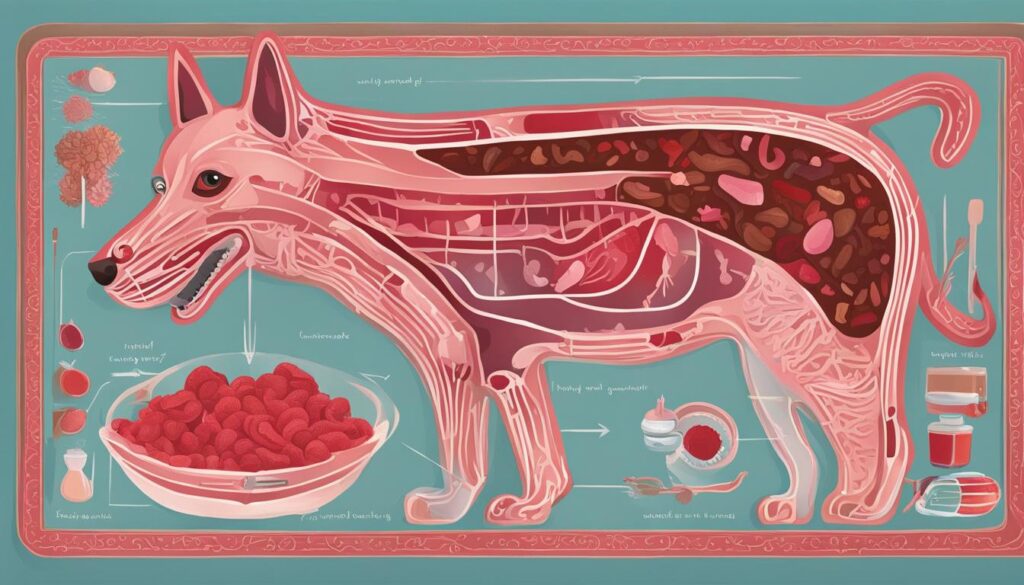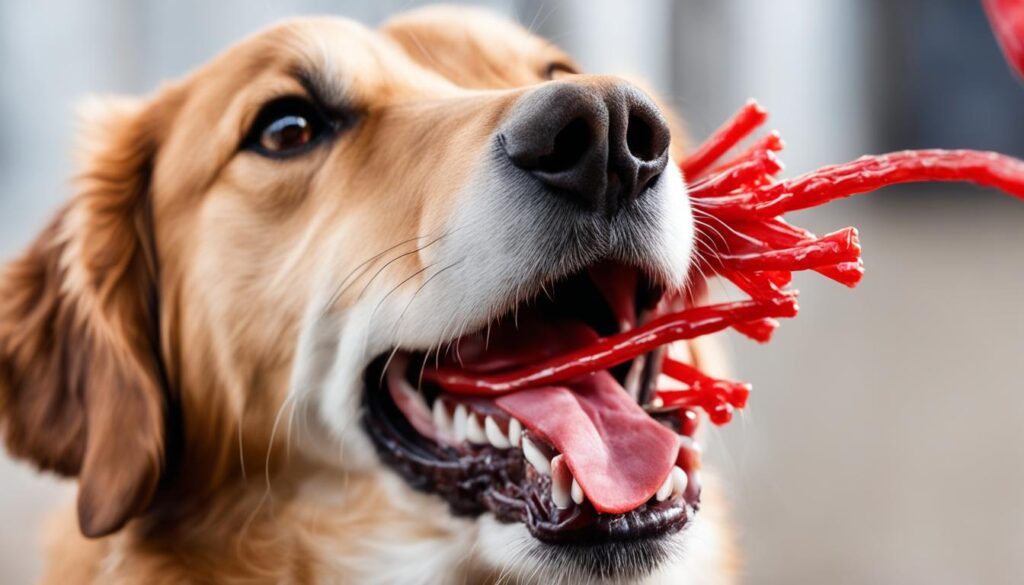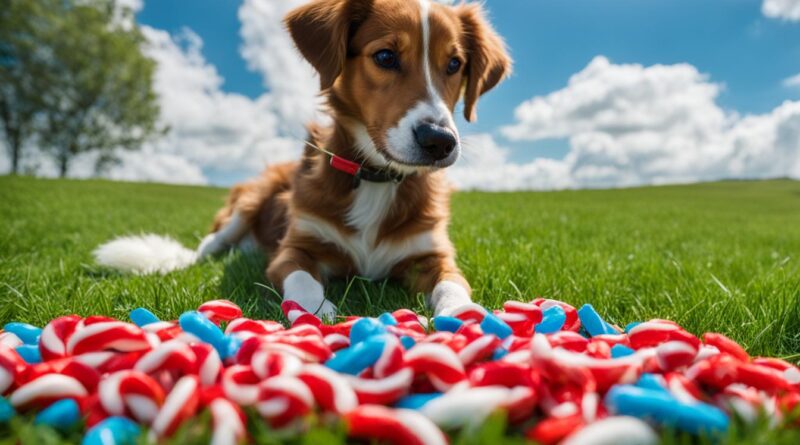Twizzlers for Dogs: Safe Snacking or Not
Twizzlers are a popular candy among both kids and adults, but can dogs eat them? While it may be tempting to share these sweet treats with your furry friend, it’s important to understand the potential risks involved. According to experts, Twizzlers are not considered safe for dogs to consume. They contain ingredients such as corn syrup, wheat flour, sugar, and artificial coloring, which can lead to digestive upsets and long-term health issues if consumed in large amounts. It’s best to avoid giving Twizzlers to your dog and opt for dog-friendly alternatives instead.
Key Takeaways:
- Twizzlers are not safe for dogs to eat due to their ingredients and potential health risks.
- Ingredients like corn syrup, wheat flour, sugar, and artificial coloring can cause digestive upsets in dogs.
- Twizzlers should be avoided to prevent long-term health issues and promote your dog’s well-being.
- Opt for dog-friendly alternatives like fresh fruits, vegetables, and commercially available dog treats.
- Consult with a veterinarian for personalized advice on feeding your dog and prioritize their dietary needs.
Understanding a Dog’s Digestive System
When it comes to digesting food, dogs have a unique system that differs from humans. It all begins in their mouth, where food is chewed and mixed with saliva. Unlike humans, dogs have a relatively short esophagus that leads directly to their stomachs, allowing food to move quickly through the digestive tract.
Once in the stomach, food undergoes further breakdown through the action of stomach acid and digestive enzymes. This process helps break down proteins and other nutrients present in the food. However, dogs have a limited ability to digest complex carbohydrates, such as those found in Twizzlers.
Dogs are primarily designed to process meat-based diets, as their digestive enzymes and gut bacteria are not as efficient at breaking down carbohydrates. This means that the sugar and wheat flour in Twizzlers may not be suitable for dogs to digest properly.
Canines Can’t Digest Complex Carbohydrates
Unlike humans who have the necessary enzymes to break down complex carbohydrates like grains and sugars, dogs have a limited capacity to do so. Their digestive systems are better equipped to handle proteins and fats, which are obtained from meat-based diets.
Complex carbohydrates, such as those found in Twizzlers, can be challenging for dogs to digest. The dog’s digestive enzymes and gut bacteria are not as efficient at breaking down these complex carbohydrates, which can lead to digestive issues and discomfort for our furry friends.
It’s essential to be mindful of what we feed our dogs and ensure that their diet aligns with their digestive capabilities. Opting for dog-friendly alternatives that contain easily digestible ingredients can help promote their overall well-being.
Just like us, dogs have specific dietary needs. Understanding their unique digestive system and providing them with the right nutrition ensures their optimal health and happiness. – Dr. Emily Rodriguez, Canine Nutrition Specialist
To get a better understanding of the dogs’ digestive system, let’s take a look at a table that compares the digestive differences between dogs and humans.
| Dogs | Humans | |
|---|---|---|
| Saliva | Limited in amylase (enzyme for carbohydrate breakdown) | Rich in amylase for carbohydrate breakdown |
| Stomach | Highly acidic for protein digestion | Less acidic for protein digestion |
| Enzymes | Efficient in breaking down proteins and fat | Efficient in breaking down proteins, fats, and complex carbohydrates |
| Gut Bacteria | Not as diverse in carbohydrate digestion | Diverse in carbohydrate digestion |
As seen in the table, dogs have a limited ability to digest complex carbohydrates, making it important to be cautious about the treats and foods we offer them.

Understanding the intricacies of a dog’s digestive system provides valuable insight into what foods are appropriate for them. Next, let’s explore the possible health risks associated with dogs eating Twizzlers.
Possible Health Risks of Dogs Eating Twizzlers
Feeding your dog Twizzlers can pose several health risks, making it important to understand the potential consequences. These delectable candies contain high levels of sugar, which can lead to weight gain, obesity, and dental issues in dogs. The excessive consumption of sugary treats like Twizzlers can contribute to an unhealthy diet and increase the risk of your dog developing obesity-related health problems.
While Twizzlers themselves do not contain xylitol, a toxic artificial sweetener for dogs, it’s still crucial to be cautious of other sugar-free candies that may contain this harmful ingredient. Xylitol can cause a rapid release of insulin in dogs, resulting in low blood sugar levels, seizures, and liver damage.
Another factor to consider is the artificial coloring used in Twizzlers, which may trigger allergic reactions in some dogs. Allergies can manifest as skin irritations, itching, or gastrointestinal distress.
It’s essential to monitor your dog closely if they consume Twizzlers, and be proactive in seeking veterinary care if you notice any concerning symptoms or changes in behavior.
Recommended Dog-Friendly Snack Alternatives
If you’re looking for safer and healthier snack options for your furry friend, consider offering fresh fruits and vegetables as dog-friendly treats. These alternatives provide essential nutrients and are generally low in sugar. Some suitable options include:
- Carrots
- Apples (remove seeds and core)
- Blueberries
- Green beans
Additionally, there are many commercially available dog treats specifically formulated to be safe and nutritious. Always consult with your veterinarian to ensure you’re making the best choices for your dog’s dietary needs.

| Treat | Sugar Content (%) | Artificial Sweeteners | Additional Risks |
|---|---|---|---|
| Twizzlers | 60 | None | Allergies |
| Carrots | 4 | None | None |
| Apples | 10 | None | Cyanide in seeds (avoid feeding seeds) |
| Blueberries | 14 | None | None |
| Green Beans | 1 | None | None |
What to Do if Your Dog Eats Twizzlers
If your dog happens to eat Twizzlers, it’s important to take appropriate action to ensure their well-being. Start by monitoring your dog for any immediate signs of distress, such as vomiting or diarrhea. Pay attention to any changes in behavior, appetite, or energy levels. If your dog exhibits severe symptoms or you’re unsure about Twizzlers’ ingredient risks, it’s crucial to contact a veterinarian for professional guidance. Provide your veterinarian with all the relevant information, including the quantity of Twizzlers consumed, and follow their recommendations for monitoring and treatment.
Conclusion
In conclusion, it is not safe for dogs to eat Twizzlers due to their high sugar content, potential xylitol toxicity, and artificial colors. To ensure your dog’s health and well-being, it is essential to provide them with dog-friendly snack alternatives. Instead of Twizzlers, consider offering fresh fruits and vegetables such as carrots, apples, blueberries, and green beans as healthier treat options. These natural options are not only tasty but also provide essential nutrients for your furry friend.
In addition to fresh produce, there is a wide range of commercially available dog treats that are specifically formulated to be safe and nutritious for dogs. These treats often come in various flavors and textures, catering to different preferences. They are a convenient and reliable option for providing your dog with tasty and wholesome snacks.
Remember, it is always a good idea to consult with a veterinarian for personalized advice on feeding your dog. They can provide guidance on suitable portion sizes and help you choose the most appropriate dog-friendly snacks. Prioritizing your dog’s dietary needs will contribute to their overall well-being and ensure they enjoy a happy and healthy life.
FAQ
Can dogs eat Twizzlers?
Twizzlers are not considered safe for dogs to consume. They contain ingredients such as corn syrup, wheat flour, sugar, and artificial coloring, which can lead to digestive upsets and long-term health issues if consumed in large amounts.
Why are Twizzlers not safe for dogs?
Dogs have a different digestive system than humans. Their digestive enzymes and gut bacteria are not as efficient at breaking down complex carbohydrates like those found in Twizzlers, which are primarily made of sugar and wheat flour. Additionally, the high sugar content can lead to weight gain, obesity, and dental issues in dogs.
Are there any specific risks associated with Twizzlers and dogs?
While Twizzlers themselves do not contain the artificial sweetener xylitol, it’s important to be cautious of other sugar-free candies that may contain this toxic ingredient. Xylitol can cause a rapid release of insulin in dogs, leading to low blood sugar levels, seizures, and liver damage. Additionally, the artificial colors in Twizzlers can cause allergic reactions in some dogs.
What should I do if my dog eats Twizzlers?
If your dog consumes Twizzlers, monitor them for immediate signs of distress such as vomiting or diarrhea. Keep an eye out for any changes in behavior, appetite, or energy levels. If your dog exhibits severe symptoms or if you’re unsure about the risks associated with Twizzlers, contact a veterinarian for professional guidance.
Are there any alternatives to Twizzlers that I can give my dog as a treat?
Yes, there are plenty of dog-friendly alternatives to Twizzlers. Fresh fruits and vegetables such as carrots, apples, blueberries, and green beans can be offered as healthier treat options. Additionally, there are many commercially available dog treats that are specifically formulated to be safe and nutritious for dogs. Consult with your veterinarian for personalized advice on feeding your dog and prioritize their dietary needs.


